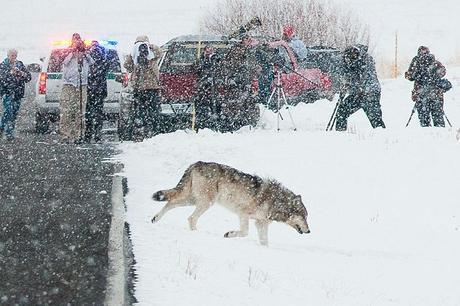by Laura Lundquist / Bozeman Daily Chronicle

Photo: Mike Greener, Bozeman Daily Chronicle
Wolf defenders led by a somewhat famous activist from out of state have chosen to focus their efforts on the greater Yellowstone area this fall, but some local wolf advocates don’t want them here.
A new group called the Yellowstone Wolf Patrol plans to arrive in the Gardiner area by Sept. 15, the opening day of the rifle wolf season, to document the wolf hunt north of Yellowstone National Park and to educate visitors about wolves, said the group’s leader, Rodney Coronado.
Taking a cue from the Buffalo Field Campaign, the group of about nine people from several states intend to patrol the park boundary to monitor and document hunting activity and serve as a deterrent against hunters pursuing wolves into the park, Coronado said.
Last year, Coronado and the group organized in opposition to the first wolf hunt in his home state of Michigan.
“We’re hoping to start a movement of monitoring projects that people will want to do in several states. We’re starting with Montana because it’s one of the earliest seasons, but we plan to be in Wisconsin for the hound-hunt there,” Coronado said. “We’re focusing on the Yellowstone area because we think it’s feasible for them to make the changes to protect wolves.”
Coronado said the group members oppose the decision of the Montana Fish, Wildlife & Parks commission to allow limited wolf hunting in hunting district 316 north of the park.
Adjoining the eastern half of the northern park boundary, wolf district 316 now has a quota of three wolves because in May, the commission reduced last season’s quota by one. Wolf district 313 around Gardiner also has a quota of three wolves.
The 2013 Legislature made quotas mandatory for hunting districts around Montana’s national parks to prevent the commission from closing the districts without a hunt, effectively creating a buffer area.
But the Yellowstone Wolf Patrol wants that buffer to protect the park wolves that have been the subjects of years of scientific research.
Coronado said wolf researchers oppose indiscriminate recreational hunting because it breaks up family units so pups don’t learn from their parents what to avoid and because it doesn’t target problem wolves. He’s also concerned about the recent FWP rule allowing landowner kills.
“We are not opposed to hunting. I’m not opposed to people filling their freezers with elk or venison, but killing apex predators that aren’t eaten and aren’t directly responsible for livestock predation, I just don’t think that’s right,” Coronado said.
Wolves of the Rockies spokeswoman Kim Bean agrees with Coronado in principle but takes issue with his methods after she and other wolf advocates lobbied to lower the quota in hunting district 316.
“We busted our asses to get these things happening, to try to get a relationship with the state, to do things in a way that’s not going to get a lot of pushback. That’s the problem when you’ve got people coming in and pushing an agenda without understanding the repercussions of that agenda,” Bean said. “If we have groups like this coming in and making waves, it makes it harder on those of us who are trying to do it in a better way.”
Coronado is a well-known animal rights activist who used to take direct action to fight animal cruelty.
He was jailed in 1995 after trying to destroy a Michigan State University laboratory that did animal testing and again in 2005 after dismantling a lion trap in Arizona.
But after six years in prison, he has had a change of heart.
The Yellowstone Wolf Patrol will go into the Absaroka Wilderness and patrol the park boundary where wolves have been shot before, Coronado said. They’ll look for elk herds and watch for any wolves that follow.
He said the patrol probably wouldn’t be wearing hunters’ orange, trusting that the kind of hunters who went into the backcountry didn’t shoot without confirming their target.
“If we’re in the situation where we see that a wolf might be killed, at the very least we want to document that and share it with the world,” Coronado said. “We’re very aware of the potential for conflict and we want to avoid that. We’ll be in an observer role on public land, not with an intention of interfering. We want to do something that’s sustainable.”
Bean worried that the patrol could end up betraying the wolves’ whereabouts to hunters.
“Stay away from the wolves — leave them alone,” Bean said.
FWP Warden Capt. Sam Sheppard said he knew Coronado might be in the area and he’ll monitor the situation.
“We have no issue with people just monitoring but it’s against the law to interfere with a hunt,” Sheppard said.

